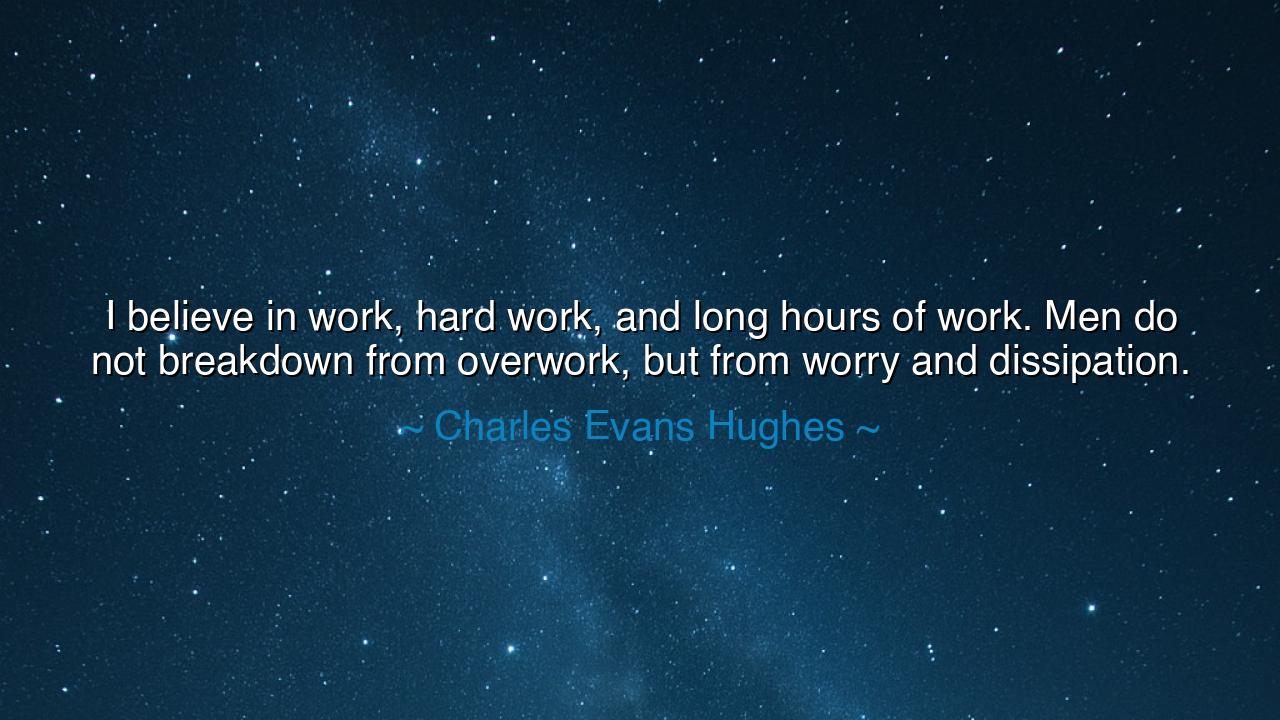
I believe in work, hard work, and long hours of work. Men do not
I believe in work, hard work, and long hours of work. Men do not breakdown from overwork, but from worry and dissipation.






Hear now the words of Charles Evans Hughes, spoken like iron upon an anvil: “I believe in work, hard work, and long hours of work. Men do not break down from overwork, but from worry and dissipation.” This utterance is not merely advice for laborers of the hand or of the mind, but a declaration of the eternal law that diligence fortifies the spirit, while idleness and aimless fretting corrode it. For in the rhythm of hard work lies a harmony with life itself, and in that harmony man finds strength.
The ancients knew this truth well. The farmer who sowed in season, the mason who shaped stone with patience, the poet who pressed words into verses like grapes into wine—each understood that the body thrives when devoted to worthy toil. The human vessel, like the plow, grows dull only when left unused, rusting in the rain of idleness or cracking under the storms of worry. Thus Hughes declares: it is not labor that crushes the soul, but the poison of restless thought and the indulgence of pleasures without discipline.
Think of the story of Theodore Roosevelt, who, stricken with weakness and sickness in his youth, did not resign himself to frailty. He embraced the strenuous life, rising at dawn, training his body in exercise, devoting himself to ranching, reading, and statesmanship. His vigor came not from leisure, but from the fire of long hours of work directed with purpose. Roosevelt did not collapse from striving, but from the relentless push against self-pity and indulgence, he grew into a man of iron. In him we see Hughes’ words made flesh: it is not overexertion that destroys a man, but indulgence in worry or dissipation of spirit.
And let us recall too the builders of cathedrals, who labored for decades, often knowing they would not live to see the stones crowned with spires. Yet their work gave them strength, for they were bound to something greater than themselves. No idle pleasure could have filled their souls with the same lasting peace. To labor for the eternal is to rest even in toil. But to drift in dissipation is to exhaust oneself though one has done nothing of worth.
There is a heroic power in Hughes’ saying. He calls us to face the day not with fear but with willing hands. For worry is a shadow that grows larger the more it is feared, and dissipation is a flame that consumes without building. Yet the hammer of hard work strikes both aside. He who toils with purpose sleeps with peace. He who squanders his hours in unrest or vain indulgence awakens weary, though his hands remain unstained by labor.
What lesson then should the seeker of wisdom take? That the cure for weakness of body and soul is not escape but engagement. Do not flee from your tasks. Do not sit in the web of anxious thought, nor lose yourself in pleasures that wither the spirit. Instead, embrace the day’s labor, whether humble or great, with a steady heart. Work will not undo you; it will steady you. It will weave your days into strength.
Practical action lies before you: rise early and devote yourself to the craft that is yours. When the burden feels heavy, remind yourself that it is not the weight of toil that breaks men, but the slow corrosion of wasted hours and scattered minds. Replace idle worry with deliberate labor, replace dissipation with discipline, and you will discover the truth Hughes proclaimed—that the human spirit is not undone by work, but made whole by it.
Thus let his words echo like a bell across time: “I believe in work, hard work, and long hours of work.” Let them remind you that there is honor in sweat, peace in effort, and life in devotion. For in the end, it is not labor that breaks us, but the absence of purpose. And the one who takes up his labor with courage shall never truly be broken.






AAdministratorAdministrator
Welcome, honored guests. Please leave a comment, we will respond soon